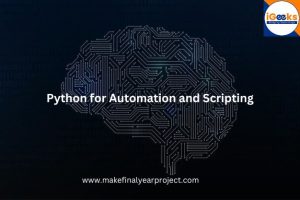By Igeeks
As India’s largest edu-tech company, we’ve created a unique live project platform for students, engineers, and researchers. Our platform stands out with innovative features, ensuring real-world relevance. We provide support and resources, cater to various disciplines, and collaborate with institutions and industry partners to enhance project quality.
Introduction to Python:
Python is a versatile and beginner-friendly programming language that has gained immense popularity for its simplicity and readability. Whether you are an aspiring programmer or looking to expand your coding skills, learning the basics of Python is an excellent starting point.
1. Setting Up Python:
Before diving into Python coding, ensure that you have Python installed on your system. You can download the latest version from the official Python website (https://www.python.org/). Follow the installation instructions based on your operating system.
2. Understanding Variables and Data Types:
In Python, variables are used to store and manage data. Learn about different data types such as integers, floats, strings, and booleans. Understand how to assign values to variables and perform basic operations.
3. Control Flow and Conditional Statements:
Explore control flow structures like loops (for and while) and conditional statements (if, elif, else). These constructs allow you to control the flow of your program and make decisions based on specific conditions.
4. Functions and Modularization:
Functions are essential for organizing code and making it more reusable. Learn how to define functions, pass arguments, and return values. Understand the concept of modularization to break down your code into manageable components.
5. Lists, Dictionaries, and Sets:
Python provides versatile data structures like lists, dictionaries, and sets. Explore how to create and manipulate lists, work with key-value pairs in dictionaries, and utilize sets for unique elements.
6. File Handling:
Learn how to read from and write to files in Python. File handling is crucial for tasks like data storage, retrieval, and processing. Understand the ‘open()’ function and different modes for file access.
7. Introduction to Object-Oriented Programming (OOP):
Get acquainted with the fundamentals of OOP in Python. Learn about classes, objects, inheritance, and encapsulation. Understand how to create and use objects to model real-world entities in your programs.
8. Exception Handling:
Explore the concept of exception handling to manage errors gracefully in your Python programs. Learn about ‘try’, ‘except’, ‘finally’, and handle different types of exceptions to enhance the robustness of your code.
Conclusion:
Learning the basics of Python opens the door to a wide range of possibilities in programming and application development. Whether you’re interested in web development, data science, or automation, mastering Python fundamentals lays a solid foundation for your coding journey. Happy coding!











